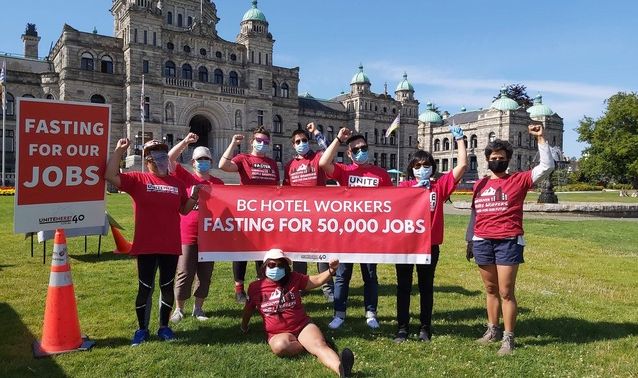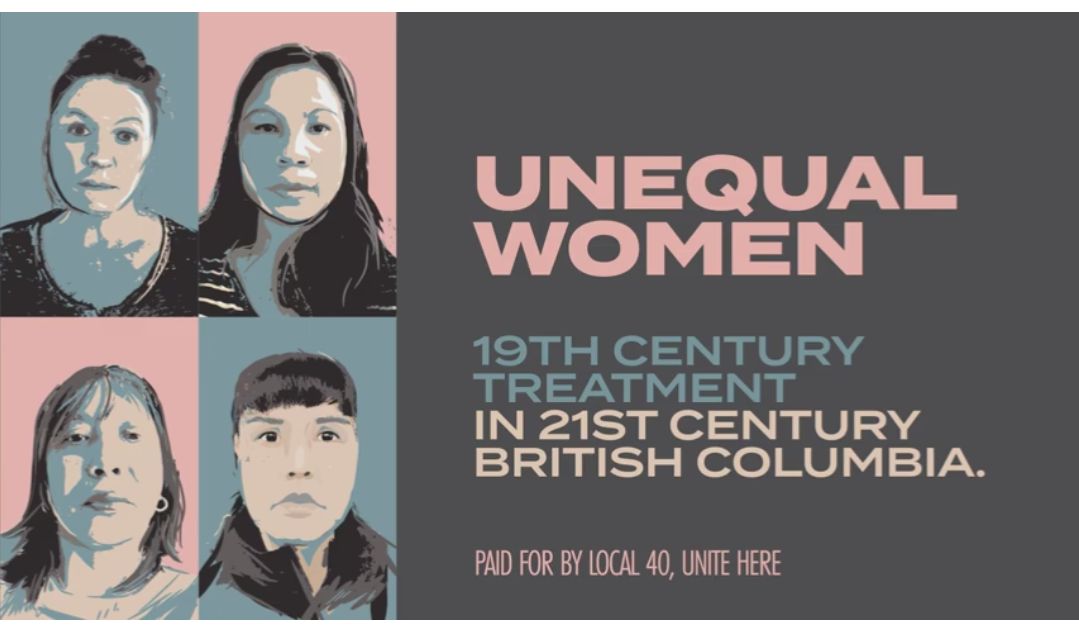Workers across the province are facing an uncertain future. Many of us were temporarily laid off due to the COVID-19 pandemic, and under the current Employment Standards Act those layoffs will become permanent and accrued benefits lost unless we are among those “lucky” enough to be called back before 6 months has elapsed. Although some workers are protected by collective agreements that extend that period, many working-class people are staring down the barrel of a double loss: the end of the CERB program in another month and the threat of no job to return to if the economy recovers from the pandemic.
Even now, some employers are taking advantage of this extraordinary situation. Workers with 5, 10, even 20 plus years of experience and associated benefits are being let go or asked to return as casual workers. Although experienced and adept workers are essential to the smooth functioning of business, bosses are using this opportunity to cut costs by not calling back senior employees, hiring new workers at lower wages to take their place. This also serves as an opportunity to terminate the employment of anyone the boss finds inconvenient, be they particularly outspoken, recently pregnant, or even a shop steward or strike leader.
On August 10, Unite Here Local 40 set up camp on the lawn of the BC legislature in Victoria, starting the Fast for Our Jobs to pressure the BC government into taking the seemingly trivial step of extending BC workers’ rights of recall. Union members, community allies, and several members of Socialist Alternative (including the authors of this article) participated in the fast on site. The fasters were joined virtually by Vancouver City Councillor Jean Swanson, who stood in solidarity with the fasters and hotel workers by holding her own hunger strike in front of NDP MLA Spencer Chandra Hebert’s office on August 12. A group of fasters, volunteers and community members continue to stand strong (though mostly sit strong) on the lawn in Victoria. The camp is attended by visitors, regular and occasional, who found the action through the Victoria Community Action Network, as well as local members of the IWW, who bring song and solidarity to the fasters.
In a press conference on August 13, Minister of Labour Harry Baines declared that a temporary lay-off extension would be put in place for businesses to give them more time before having to let their employees go permanently. Emphasis was given to “meeting the needs and demands of employers” so that they could avoid permanent lay off status and large severance payouts. When asked about the hunger strike taking place and what is being done to address the precarious situation workers are facing due to limited recall rights, Baines stated that it was up to collective agreements already in place to determine the standards for individual workplaces. “It’s a complicated process,” he said. For non-unionized workplaces, he noted that he expected workers and employers to work together to ensure job security and business stability.
Leaving the fate of workers up to the discretion of their employers was not the answer we were waiting for. At this point, some of us had already been fasting for four days, and to listen to Minister Baines align with employers over workers and leave numerous questions unanswered was frustrating to say the least.
Baines noted that the NDP government had hired a labour lawyer, Sandra Bannister, to produce a report on August 20 to advise the government on what could be done about the potential conflicts between an amendment to recall rights within the Employment Standards Act and collective agreements already in place. A simple solution would be that the Employment Standards Act is the floor; collective agreements can only have higher, not lower, standards. This would give workers more security and undermine the scab non-union CLAC that signs sweetheart deals with employers that are worse than the Act. This change, adding to workers’ protection, will cost no more than the ink to put it to the page.
It is notable that Minister Baines had many details queued up and ready to go with regard to what was to be done to help businesses, big and small, but when asked about what was being done to protect workers, he only deferred to the fact that a lawyer had been contracted to explore the possibilities. It is also notable that despite how frustrating it was to see the Minister prevaricate and refuse to commit to a position on a simple question, it was a marked improvement from his previous total dismissal of the question during negotiations some months earlier. Already people are losing their jobs permanently and trusting employers across the province to “do the right thing” is not an effective government policy during a crisis.
Tourism industry bosses have asked for a $680 million bailout. The money, if agreed, should be used to protect workers not the bosses’ profits. A core requirement must be the re-hiring of laid-off workers.
Unite Here is also collecting petition signatures and visiting MLAs’ offices across the province. Socialist Alternative, in addition to the five members participating in Victoria, supported councillor Swanson and is helping to gather signatures in Metro Vancouver. The response has been amazing – almost all workers agree that workers’ rights to their jobs should be protected, especially from an NDP government that most of them voted into office.
Workers are in this together. Hotels have been among the hardest hit by the pandemic. With no cruises, conventions or border crossings for the foreseeable future, workers in hospitality are particularly vulnerable. It is no surprise then, that a hospitality workers’ union took upon itself to organize this struggle. But the demand of extended recall rights will benefit many workers across all sectors of BC, both unionized and not. In the same way as a strike victory improves the working conditions in major hotels and sets a new regional standard that non-union hotels must elevate themselves to, the fasters on the lawn of the legislature stand for all workers.
By a similar turn, though the Fast for Our Jobs does require a degree of personal sacrifice from its participants, it does not depend on individuals making monumental personal sacrifices to succeed. None of the original fasters who started on August 10 remain: some were told to stop fasting by a nurse, others simply had to go home. Yet, more fasters have come to take their place, in turn, to do their own part. Unlike what politicians and CEOs love to say, we the workers are not “in this together” with the bankers and bosses and billionaires. But workers ARE in this together, fighting for each other. And when we fight, we win.




